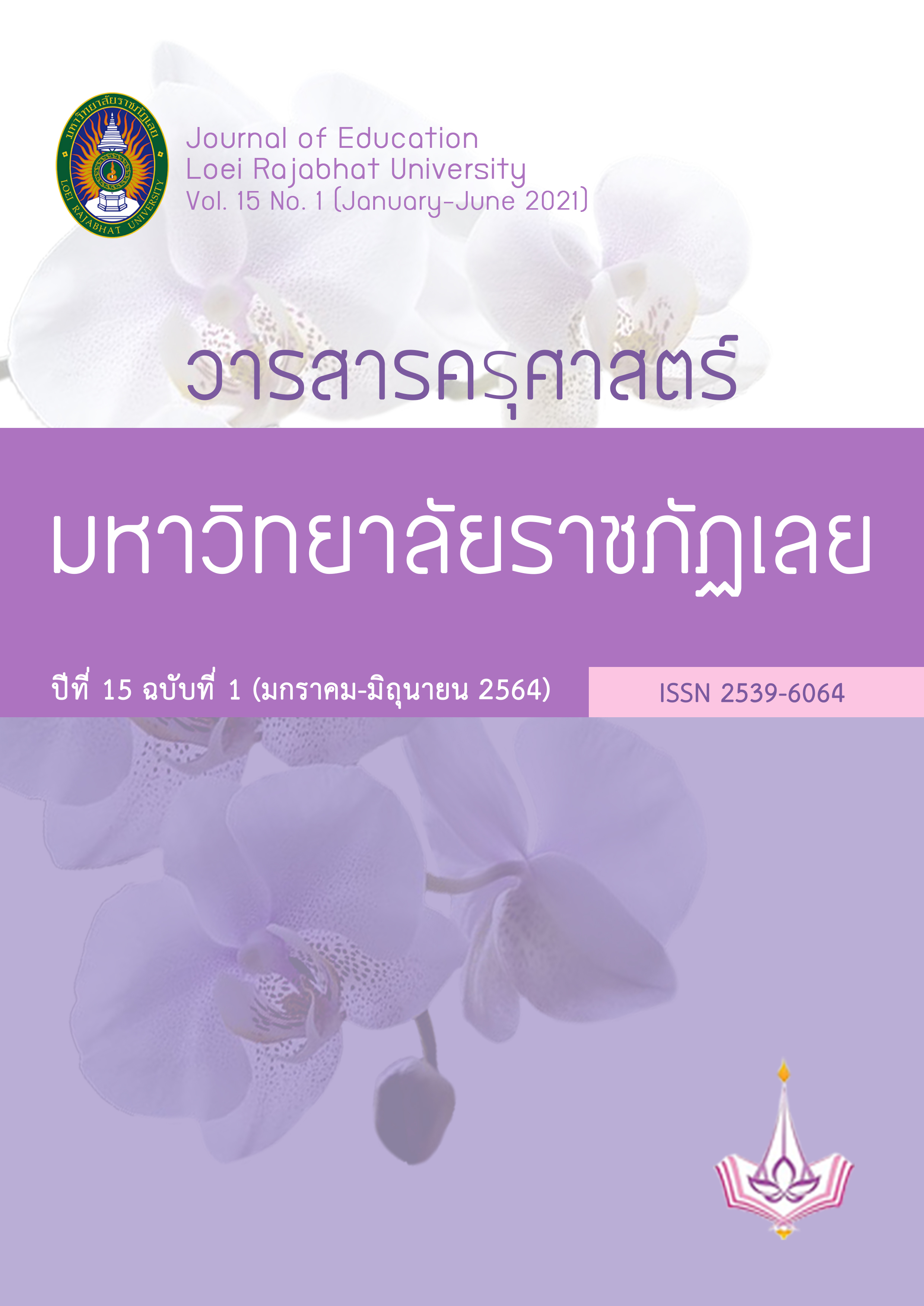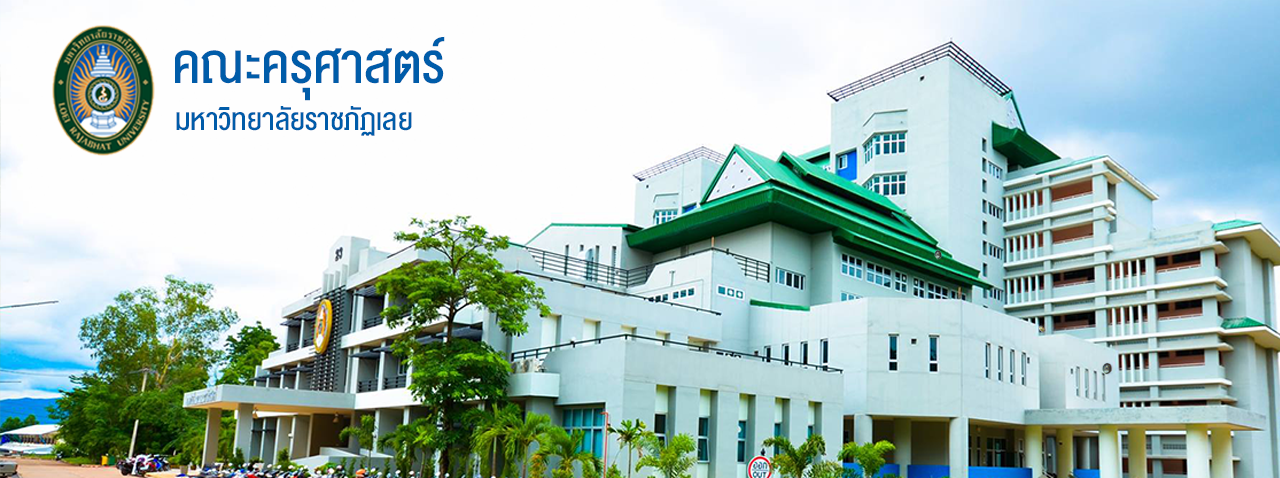ANALYTICAL THINKING ABILITY ON FACTORING POLYNOMIALS OF DEGREE2 USING THE FIVE-STEPPED INQUIRY PROCESS FOR MATHAYOMSUKSA2 STUDENTS
Keywords:
mathematics learning achievement, the five-stepped inquiry process, analytical thinkingAbstract
The research aimed: 1) to compare the mathematics learning achievement before and after learning factoring polynomials of degree2 using the five-stepped inquiry process; 2) to compare the mathematics learning achievement after learning with the passing criteria of 70 percent; and 3) to study analytical thinking ability on factorization problem of polynomial degree2 of Mathayomsuksa2 students after learning by the five-stepped inquiry process. The target samples were 26 of Mathayomsuksa2 students of Bualuangwitthayakhom School, 2nd semester, academic year of 2020 obtained through cluster sampling of 1 classroom. The research tools were: 1) 8 sets of learning plans, and
2) a 20-item multiple choice test with four choices. The statistics used for data analysis were percentage, mean, standard deviation, one sample t-test, and dependent sample t-test. The findings were as follows: 1) the students’ mathematics learning achievement after learning by using the five-stepped inquiry method was significantly higher than before the study at the level of .05; 2) the students’ mathematics learning achievement after learning by using the five-stepped inquiry method was significantly higher than the set passing criteria of 70 percent at the level of .05; and 3) the students’ analytical thinking ability was found in
2 characteristics: (3.1) the analysis of relation: the students knew the value of each term with integer coefficients, and (3.2) the analysis of principles: students were able to analyze the relation of the coefficients which led them to understand the principle of factorization problem of polynomial degree2.
References
กระทรวงศึกษาธิการ. (2560). หลักสูตรการศึกษาขั้นพื้นฐาน พุทธศักราช 2551 (ฉบับปรับปรุง พ.ศ.2560). กรุงเทพฯ: โรงพิมพ์คุรุสภา.
รัชดาพร ทองยศ. (2561). การพัฒนากิจกรรมการเรียนรู้คณิตศาสตร์โดยใช้รูปแบบการสอนแบบสืบเสาะหาความรู้ (5ES) ที่เน้นการคิดวิเคราะห์ เรื่อง การแยกตัวประกอบพหุนามดีกรีสอง ชั้นมัธยมศึกษาปีที่ 2. วารสารวิจัย มหาวิทยาลัยขอนแก่น (ฉบับบัณฑิตศึกษา). สาขามนุษยศาสตร์และสังคมศาสตร์: มหาวิทยาลัยขอนแก่น.
วิณารัตน์ ราศิริ. (2552). การพัฒนาชุดกิจกรรมการเรียนรู้แบบ 5E เพื่อพัฒนาผลสัมฤทธิ์ในการแก้โจทย์ปัญหาคณิตศาสตร์ และความพึงพอใจต่อการเรียนคณิตศาสตร์ของนักเรียนชั้นประถมศึกษาปีที่2. (วิทยานิพนธ์ปริญญามหาบัณฑิต) บัณฑิตวิทยาลัยมหาวิทยาลัยราชภัฏพิบูลสงคราม.
สถาบันทดสอบการศึกษาแห่งชาติ (องค์การมหาชน). (2559). ระบบประกาศและรายงานผลสอบโอเน็ต. เข้าถึงเมื่อวันที่ 1 เมษายน. เข้าถึงได้จาก http://www.onetresult.niets.or.th
/AnnouncementWeb/Login.aspx76
สมบัติ การจนารักพงค์ และคณะ. (2549). เทคนิคการจัดกิจกรรมการเรียนรู้แบบ 5E ที่เน้นพัฒนาทักษะการคิดขั้นสูง. กรุงเทพฯ: ธารอักษร.
สิริพร ทิพย์คง. (2544). การวิจัยการเรียนการสอนคณิตศาสตร์ ปีการศึกษา 2521 – 2542. กรุงเทพฯ:
ภาควิชาการศึกษาคณะศึกษาศาสตร์ มหาวิทยาลัยเกษตรศาสตร์.
Downloads
Published
Versions
- 2023-03-08 (3)
- 2021-06-02 (1)
How to Cite
Issue
Section
License

This work is licensed under a Creative Commons Attribution-NonCommercial-NoDerivatives 4.0 International License.
เนื้อหาและข้อมูลในบทความที่ตีพิมพ์ในวารสารครุศาสตร์ มหาวิทยาลัยราชภัฏเลย ถือเป็นความคิดเห็นและความรับผิดชอบของผู้เขียนบทความโดยตรง กองบรรณาธิการวารสารไม่มีส่วนในความคิดเห็นและความรับผิดชอบใดที่เกี่ยวข้องกับบทความดังกล่าว ทั้งนี้ บทความที่ได้รับการตีพิมพ์ในวารสาร ฯ ถือเป็นลิขสิทธิ์ของวารสาร







